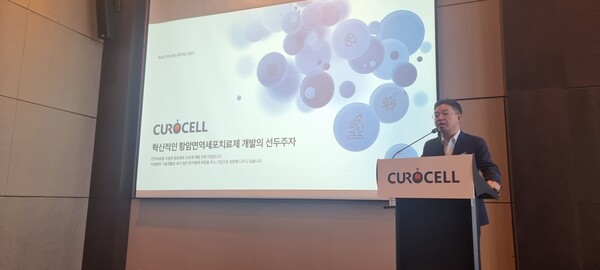Curocell announced that it has concluded the phase 2 clinical trials of its CAR-T (chimeric antigen receptor-T) drug, Anbal-cel, for treating diffuse large B-cell lymphoma (DLBCL) as it recently completed administering the treatment to the final patient.

Speaking at a press conference on Friday notifying the company's planned initial public offering in November, CEO Kim Gun-soo said the company will get the trial resultsearly next year.
Then, Curocell will present the results at a cancer meet in the first half and seek biological license application (BLA) in the second half.
"CAR-T therapy has proven revolutionary in treating terminal blood cancers," Kim said. "Curocell is committed to becoming a global leader in innovative cancer immunotherapy, backed by our pioneering commercialization of Korea's first CAR-T treatment."
CAR-T therapy, hailed as a next-generation treatment, harnesses a patient's immune T-cells, genetically modified outside the body to react specifically against cancer cells. This modified cell is then reintroduced into the patient, potentially creating a complete cure in terminal blood cancer patients with a single injection.
The firm's CAR-T therapy, designed with OVIS technology, suppresses the expression of two immune checkpoint receptors -- PD-1 and TIGIT. This innovation aims to enhance the efficacy of typical CAR-T therapies.
The company has already confirmed positive results using this technology.
“After analyzing the clinical trial samples, the company has confirmed that it inhibited the expression of PD-1, which reduces the function of CAR-T therapies, by 70 percent, inhibited the expression of TIGIT by 90 percent, and significantly improved the therapeutic performance compared to the general CAR-T therapies sold in the global market," Kim said.
The interim results of the phase 2 trial for Anbal-cel, which uses the OVIS technology, in treating DLBCL showed a complete remission rate of 71 percent, significantly exceeding the 40 percent complete remission rate of Novartis' Kymriah, the only CAR-T therapy available in Korea, Kim added.
Kim stated, "While Korea fell behind considerably to CAR-T developers in other countries, our commitment in developing Anbal-cel has placed Korea on par with international entities."
In addition to the high efficacy of the treatment, the company also has secured its own manufacturing facility.
In April this year, the company completed the country's first and largest commercial GMP production facility for CAR-T treatment and is currently undergoing validation for approval. The facility has an annual production capacity to produce CAR-T treatment for 700 people.
"There are many companies developing CAR-T, but the important thing is processing capacity," said Kim. "As investment in the biosector becomes difficult, it will be hard for unlisted companies to secure manufacturing facilities worth 40 to 50 billion won ($29.5 million-$36.9 million), and this will be the competitive advantage of Curocell."
Kim explained that securing a manufacturing facility means fast dosing, which will help the company's possible expansion into the Asia-Pacific region, where global pharmaceutical companies are less interested.
"It can also be utilized for manufacturing other companies CAR-T treatment," he said.
Another advantage Kim highlights is the fast administration of its drug to patients in Korea compared to other foreign counterparts.
"While current CAR-T therapies need to be manufactured overseas, which makes the process take about five to six weeks, Curocell has developed a rapid test method for quality inspection for CAR-T therapy and has its manufacturing facility, which can drastically shorten this period to 16 days," Kim said.
In business updates, Curocell, after filing for a special technology listing system to be listed on the Kosdaq in May, passed the preliminary listing review on Sept. 7.
In a planned IPO in November, the company plans to offer 1.6 million depository receipts at the offering price range of 29,800 won to 33,500 won per share to raise a maximum of 53.6 billion won.
Institutional investor demand forecasts are slated for a five-day window from Friday to next Thursday and receive subscriptions from retail investors from Oct. 31 to Nov. 1. Samsung Securities and Mirae Asset Securities are currently serving as lead underwriters.
Related articles
- Curocell sees ‘Kosdaq listing in November barring unexpected variables’
- Curocell begins clinical trial of CAR-T therapy for ALL patients
- Curocell speeds to write new history in homegrown CAR-T therapy
- 'Polivy' transforms 1st-line treatment for DLBCL after 20 years
- [ESMO 2023] Has Korean CAR-T treatment Anbal-cel won the greenlight at ESMO?
- Curocell confirms IPO price, gears up for Kosdaq listing
- Following the US, Korean regulator obligates monitoring of CAR-T cell therapies
- Bill proposed to expand medical institutions providing CAR-T treatment
- Curocell's CAR-T therapy effective to treat DLBCL in phase 2 study
- Curocell receives government funding to expand CAR-T treatment into lupus

